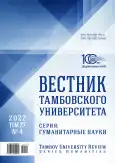Specifics of the application of the socio-cultural approach in the process of developing individual’s information and legal competence
- Authors: Kuznetsova N.V.1,2
-
Affiliations:
- Moscow City University
- Main Directorate of the Ministry of Internal Affairs of the Russian Federation for the Moscow Region
- Issue: Vol 27, No 4 (2022)
- Pages: 880-887
- Section: PEDAGOGY OF HIGHER EDUCATION
- URL: https://journal-vniispk.ru/1810-0201/article/view/298263
- DOI: https://doi.org/10.20310/1810-0201-2022-27-4-880-887
- ID: 298263
Cite item
Full Text
Abstract
The features of the process of development of information and legal competence of a person are considered. The socio-cultural approach is substantiated and updated, the feature of which is the development of leisure self-organization of the individual in the context of a conscious choice of forms of leisure activities that ensure the development of socio-cultural activity, manifested in the initiative to master professional competencies. A review of the leading concepts on socio-cultural activities was carried out, with the emphasis on creating conditions that ensure the development of information and legal competence. With the justification of innovative approaches to self-education and professional development of the individual, emphasis is placed on gamification, which allows the learning process to be carried out not only in classrooms, but also in the process of extracurricular activities. The features of digitalization and informatization technologies are revealed, their role in the transformation of professional activities practices, which allow improving the process of developing educational programs that meet the requirements of modern society, is noted. An analysis of sources on the problems of pedagogical support for the process of personality formation led to the conclusion that the modern education system should be aimed at developing the skills of independent creative thinking, focused on achieving a high level of professionalism, and such opportunities have socio-cultural activities that have in their arsenal technological means, forms and methods of effective training and education.
About the authors
N. V. Kuznetsova
Moscow City University; Main Directorate of the Ministry of Internal Affairs of the Russian Federation for the Moscow Region
Author for correspondence.
Email: 2012kuznetsova@gmail.com
ORCID iD: 0000-0001-7767-5514
Competitor of Socio-Cultural Activities and Performing Arts Department; Deputy Head for Academic Affairs – Head of Educational Department of the Vocational Training Center
4-1 2-y Selskokhozyaystvennyy Dr., Moscow 129226, Russian Federation; 3 Nikitskiy Ln., Moscow 125009, Russian FederationReferences
- Kuznetsova N.V. Formirovaniye informautsionno-pravovoy kompetentsii lichnosti: sotsial’no-kul’turnyy aspect [Formation of information and legal competence of the individual in the conditions of global informatization of modern society: socio-cultural aspect]. Kul’tura i obrazovaniye [Culture and Education], 2019, no. 4 (35), pp. 86-93. https://doi.org/10.24411/2310-1679-2019-10410. (In Russian).
- Sorokin P.A. Chelovek, tsivilizatsiya, obshchestvo [Man, Civilization, Society]. Moscow, Politizdat Publ., 1992, 543 p. (In Russian).
- Pindus V.Y., Grigoreva E.I. Osobennosti formirovaniya pravosoznaniya voennosluzhashchikh po prizyvu v usloviyakh sotsialno-kul'turnoy deyatel'nosti [The peculiarities of sense of justice of military men at the call in the conditions of socio-cultural activity]. Vestnik Tambovskogo universiteta. Seriya Gumanitarnye nauki – Tambov University Review. Series: Humanities, 2017, vol. 22, no. 5 (169), pp. 76-81. https://doi.org/ 10.20310/1810-0201-2017-22-5(169)-76-81. (In Russian).
- Sharkovskaya N.V. Sushchnost’ i spetsifika ponyatiya «sotsial’no-kul’turnaya tekhnologiya»: teoretiko-metodologicheskiy aspekt [Essence and specificity of the concept “social and cultural technology”: theoretical and methodological aspect]. Kul’tura i obrazovaniye [Culture and Education], 2020, no. 4 (39), pp. 95-105. https://doi.org/10.24412/2310-1679-2020-439-95-105. (In Russian).
- Yaroshenko N.N. Zarubezhnoye dosugovedeniye: mezhdu gumanitarnoy refleksiyey i empirizmom [Foreign leisure studies: between humanitarian reflection and empiricism]. Vestnik Moskovskogo gosudarstvennogo un-iversiteta kul’tury i iskusstv – The Bulletin of Moscow State University of Culture and Arts, 2020, no. 5 (97), pp. 122-135. https://doi.org/10.24412/1997-0803-2020-597-122-135. (In Russian).
- Streltsov Y.A. Kul’turologiya dosuga [Cultural Studies of Leisure]. Moscow, Moscow State University of Cul-ture and Arts Publ., 2003, 297 p. (In Russian).
- Andreyev A.L. Obshchestvo i obrazovaniye: Sotsiokul’turnyy profil’ Rossii [Society and education: sociocultur-al profile of Russia]. Pedagogika [Pedagogy], 2002, no. 6, pp. 20-29. (In Russian).
- Ivanova V.I. Organizatsionnyye i soderzhatel’nyye osnovy prosvetitel’skoy deyatel’nosti [Organizational and content bases of educational activity]. Chelyabinsk, South Ural State Humanitarian Pedagogical University Publ., 2017, 199 p. (In Russian).
- Gerasimova I.A. Geymifikatsiya kak sposob vklyucheniya molodezhi v obrazovatel’nuyu i dosugovuyu indus-triyu [Gamification as a way to include young people in the educational and leisure industry]. Sotsial’no-kul’turnaya deyatel’nost’ v sovremennom gumanitarnom diskurse [Social and Cultural Activities in Modern Humanitarian Discourse]. Moscow, Moscow State Institute of Culture Publ., 2021, pp. 176-183. (In Russian).
- Grigorieva E.I., Maksimova L.N. Proyektirovaniye kak effektivnaya tekhnologiya obucheniya studentov tvor-cheskikh spetsial’nostey [Project as an effective technology for teaching students of creative specialties]. Vestnik Tambovskogo universiteta. Seriya: Gumanitarnye nauki – Tambov University Review. Series: Humanities, 2021, vol. 26, no. 193, pp. 141-148. https://doi.org/10.20310/1810-0201-2021-26-193-141-148. (In Russian).
- Sharkovskaya N.V. Sotsial’nyye funktsii kul’turnykh institutsiy i tvorcheskikh klasterov [Social functions of cultural institutions and creative clusters]. Sotsial’no-kul’turnaya deyatel’nost’ v sovremennom gumanitarnom diskurse [Social and Cultural Activities in Modern Humanitarian Discourse]. Moscow, Moscow State Institute of Culture Publ., 2021, pp. 53-61. (In Russian).
Supplementary files








